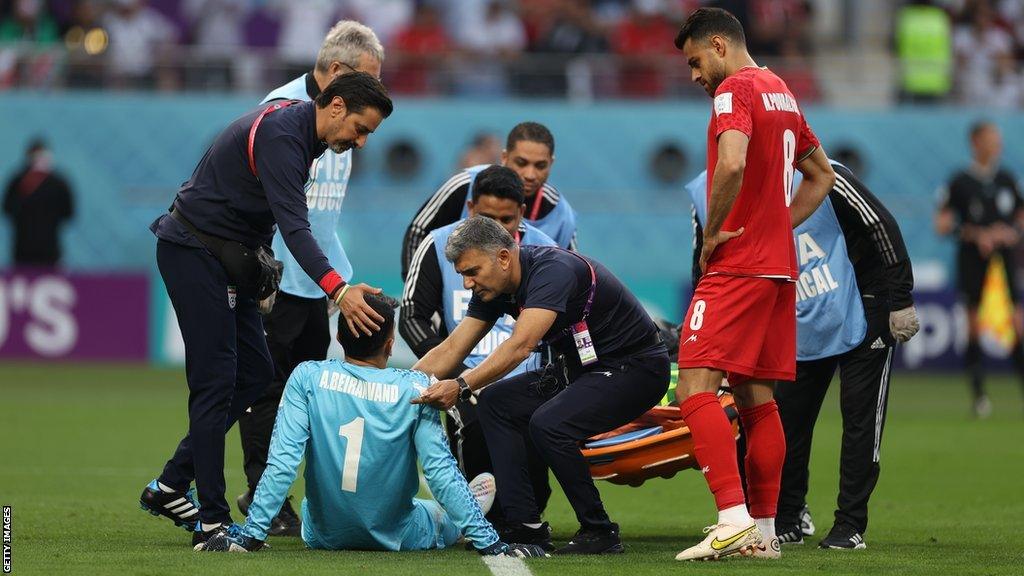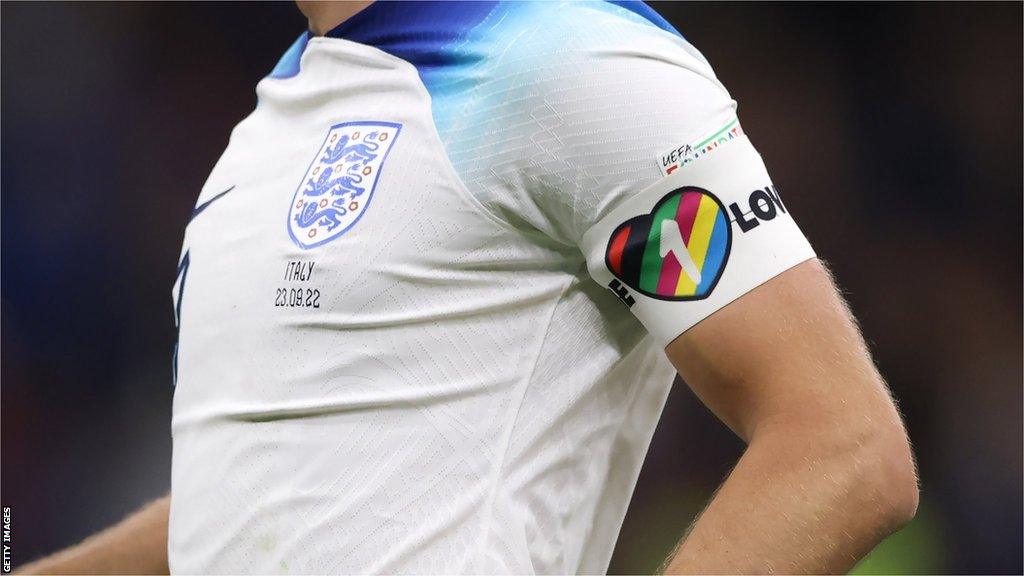Concussion substitutes: Fifa welcome Ifab decision to continue permanent replacements trial
- Published

Alireza Beiranvand suffered a head injury in the opening stages of Iran's World Cup game against England, leading to 14 minutes added on at the end of the first half
Fifa president Gianni Infantino says football is making player health the main priority after a decision to continue the permanent concussion substitutes trial.
Football's lawmakers Ifab rejected 11th-hour pleas from the Premier League and the Professional Footballers' Association (PFA) to trial temporary concussion substitutes at their annual meeting in London on Saturday.
Football Association chief executive Mark Bullingham said there was "a difference of opinion" on the merits of temporary substitutes but, for now, it has been decided the permanent model will stay.
"We have decided to put the health of the players at the top," said Infantino.
"If there is a risk or feeling or possibility that there has been a concussion it's better to take the player out, to take zero risk."
It was felt running two trials at the same time would not provide enough data to draw a meaningful conclusion.
There is a view at Fifa that, in some parts of the world, concussion is not viewed as a significant issue.
The example of Iran goalkeeper Alireza Beiranvand, who collided with a team-mate during the World Cup group game with England yet continued when he was unfit to do so, gives credence to that theory.
It is accepted that was a mistake and Scottish FA chief executive Ian Maxwell said of issues around the approach to potential concussions: "It is not a protocol problem, it is an implementation problem."
The International Football Association Board first approved the trials of concussion substitutes at a meeting in December 2020.
Stoppage time will rise
Bullingham accepted there will be a rise in the amount of stoppage time after Ifab signed off the worldwide implementation of the World Cup method of calculating additional time - whereby time lost to goal celebrations, substitutions, injuries and general time-wasting was dealt with accurately rather than rough estimates as is currently the case in the Premier League.
It is estimated in some leagues effective match time has slipped below 50 minutes.
English referees' chief Howard Webb is known to be dubious about the plan, which Ifab want referees to deal with, rather than bringing in a specific timekeeper as is the case in rugby league.
While Bullingham feels it will eventually settle down as players start to realise their delays are having no impact, he accepts initially the length of matches will increase.
"There are two fundamental challenges," he said.
"One is that effective playing time is really variable between games. You can get as much as 25 minutes variable. So how do you reduce that?
"The second thing is, how do you make sure there's no incentive for time wasting? What Fifa did in Qatar helped both of those.
"It [injury time] will go up. But I think you will see a reaction. What you saw in Qatar was lots of extra time added, then it actually became a bit less because players then knew there was no point in staying down."
Fifa keen for OneLove armband solution

England, Wales and other European nations did not wear the OneLove armband at the World Cup in Qatar because of the threat of players getting yellow cards
Fifa are keen to avoid a repeat of the Qatar 2022 row over the OneLove armbands at this year's Women's World Cup in Australia and New Zealand.
A number of European countries agreed to wear the armbands in Qatar as a symbol of unity and inclusion. Then on the eve of the tournament, Fifa banned them because it broke their regulations and introduced their own armband instead.
"We all went through a learning process," said Infantino.
"What we will try to do better this time is to search for a dialogue with everyone involved, the captains, the federations, the players.
"Fifa want to capture the different sensitivities and see what can be done in order to express a position, a value or a feeling that somebody has in a positive way without hurting anyone else.
"We will have a solution in place well before the Women's World Cup."
Referee abuse a worldwide problem
Infantino said Fifa welcomed the FA initiative to introduce bodycams for referees at grassroots level in an attempt to tackle abuse of officials.
He said it was a priority for everyone involved in the game to protect referees.
"Whatever good idea anyone has, please bring it forward," he added.
"We'll take it on board because it's a problem, an issue all over the world, and we are losing a lot of young referees.
"Why would you referee a game if you're insulted or risk being hit by people?"
FA open to overseas player rule change
Bullingham said he is open to "refining" the current rules around overseas players moving to England after reporting "worrying trends" around the number of English players in the Premier League since Brexit.
Bullingham said English players under the age of 21 had seen their playing time cut by half and the overall number of English players being picked had dropped to 28%.
Premier League chief executive Richard Masters said earlier this week clubs were missing out on top young players because of the points system that is now in place and were consequently having to pay more when they did become available.
Bullingham said he does not totally agree with that, but he does accept there are problems to be sorted.
"The reality is there's only a small number of players who will actually be adding value to Premier League teams and if you have a bidding war for a player, it's always going to drive up the price," he said.
"In the last two transfer windows there have been more foreign players signed than any transfer window previously.
"We wouldn't be saying 'just lower the immigration bar and flood in more talent' because we're at 28%. But there are ways we think of achieving both their aim and ours.
"For example, you can have a system that allows clubs to sign a small number of players on a lower point system, so they could sign him when he's £3m rather than waiting until he's £30m."